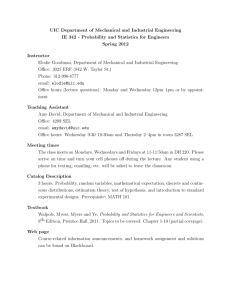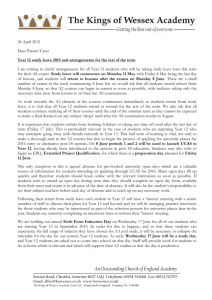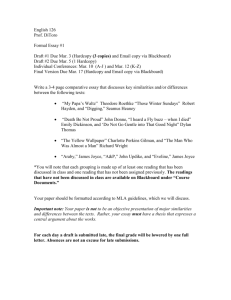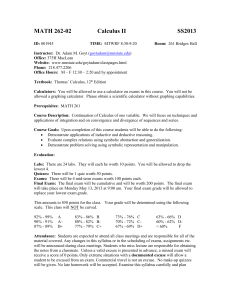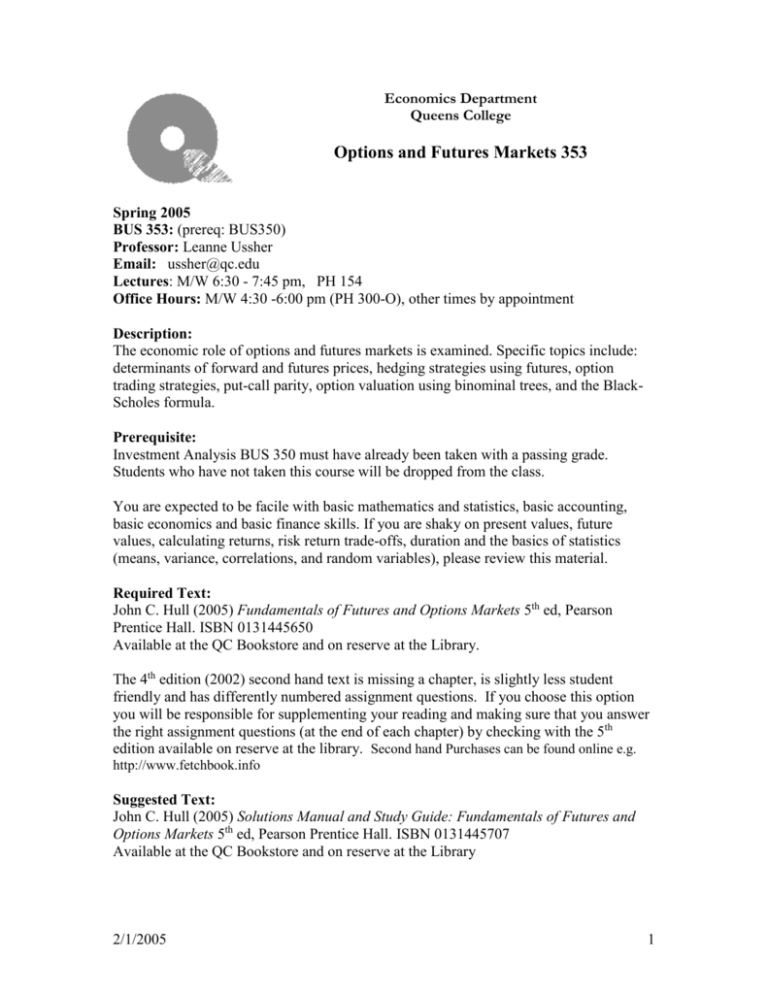
Economics Department
Queens College
Options and Futures Markets 353
Spring 2005
BUS 353: (prereq: BUS350)
Professor: Leanne Ussher
Email: ussher@qc.edu
Lectures: M/W 6:30 - 7:45 pm, PH 154
Office Hours: M/W 4:30 -6:00 pm (PH 300-O), other times by appointment
Description:
The economic role of options and futures markets is examined. Specific topics include:
determinants of forward and futures prices, hedging strategies using futures, option
trading strategies, put-call parity, option valuation using binominal trees, and the BlackScholes formula.
Prerequisite:
Investment Analysis BUS 350 must have already been taken with a passing grade.
Students who have not taken this course will be dropped from the class.
You are expected to be facile with basic mathematics and statistics, basic accounting,
basic economics and basic finance skills. If you are shaky on present values, future
values, calculating returns, risk return trade-offs, duration and the basics of statistics
(means, variance, correlations, and random variables), please review this material.
Required Text:
John C. Hull (2005) Fundamentals of Futures and Options Markets 5th ed, Pearson
Prentice Hall. ISBN 0131445650
Available at the QC Bookstore and on reserve at the Library.
The 4th edition (2002) second hand text is missing a chapter, is slightly less student
friendly and has differently numbered assignment questions. If you choose this option
you will be responsible for supplementing your reading and making sure that you answer
the right assignment questions (at the end of each chapter) by checking with the 5th
edition available on reserve at the library. Second hand Purchases can be found online e.g.
http://www.fetchbook.info
Suggested Text:
John C. Hull (2005) Solutions Manual and Study Guide: Fundamentals of Futures and
Options Markets 5th ed, Pearson Prentice Hall. ISBN 0131445707
Available at the QC Bookstore and on reserve at the Library
2/1/2005
1
Any student who feels daunted by this subject should answer additional practice
questions, with the aid of the solutions manual, to help familiarize themselves with the
math and method of pricing derivatives.
Online Course Information:
Readings placed on reserve are listed at the library reserve site:
http://www.reserve.qc.edu
password: uss353
The syllabus, lecture notes, assignments, grades and announcements will be available at
Blackboard (see below for instructions): http://www.cuny.edu/
Other Information Sources:
There will be some occasional handouts in class from the financial press.
Students are encouraged to do regular reading of the financial press, such as the Wall
Street Journal (http://interactive.wsj.com). This can be accessed on campus at the library
website under “E-Periodicals (A-Z)”. A subscription to the WSJ for 15 weeks is $32
(http://online.wsj.com/registration/student). Put as your referring professor “other” and
enter my name.
Other recommended financial press includes the Financial Times (http://www.usa.ft.com)
or the business section of the New York Times.
There also are websites dedicated to derivatives markets. Futures Magazine
(http://www.futuresmag.com) provides information on daily futures market activity,
analysis of underlying cash markets and other useful tools for futures trading.
Information about stock option trading, including real-time access to news and option and
stock quotes can be found on the web site of the Chicago Board of Options Exchange
(CBOE, http://www.cboe.com).
Course Requirements:
The course grade will be based on 3 assignments, 2 exams (midterm and final), and class
participation. At the end of each chapter you should answer all the Quiz questions and
some of the Questions and Problems from the book (solutions are in the Solutions
Manual on reserve). While these will not be collected, a selection of these questions will
appear in the midterm and final exams.
Assignments:
All questions are from the text book. Check Blackboard for additional questions and
method of submission.
Assignment Set 1: 1.24, 1.26, 2.27, 3.23, 3.24, 4.24, 5.24, 5.26 (due week 5)
Assignment Set 2: 6.26, 6.27, (7.21, 7.23), 8.27, 9.23, 9.25, 10.20, (due week 10)
Assignment Set 3: 11.20, 12.23, 12.24, (due week 14)
2/1/2005
2
Examinations:
There will be 2 exams. Examination questions will be multiple choice, and short and
long answer questions. Most questions will be selected from the questions at the end of
the chapters and your assignment questions, with some modification.
The weights are as follows:
Attendance and class participation: 5%
3 class assignments total: 30%
Mid Semester Exam: 30%
Final Exam: 35%
Blackboard:
Check Blackboard regularly by logging onto Blackboard through the CUNY portal.
http://www.cuny.edu
If you do not already have a Portal ID, go to www.cuny.edu and click on "Log In" at the
bottom left. Then click on "Register New User".
Course documents, lecture notes, important announcements, your assignment questions
and grades will be posted on the Blackboard website. You are responsible for checking
Blackboard for information.
Make sure that your Blackboard contact email is correct!
Update your email for the class on Blackboard as soon as possible. Without the correct
email you will not receive class email notices.
For questions on the homework assignment or questions prior to the exams you may
make use of the “Discussion Board.” Post your questions here so that I, or other students,
can publicly answer them for all students to see.
Other important course policies:
1. Make-up exams are given in cases of documented severe personal emergency
only.
2. All suspected cases of academic misconduct will be reported to the department,
the Vice President for Student Affairs, and the judicial hearing officer.
3. If you miss a class, you are responsible to get a copy of the notes from your
classmates.
Acknowledgment:
Many of the lecture notes and other course materials are derived from those used by
Professor John C. Hull at the University of Toronto, Professor Daniel Oglevee at Ohio
State University and Professor Craig W. Holden at the Kelley School of Business,
Indiana University.
2/1/2005
3
Each class period includes required readings and study questions from the text book.
Dates in the course outline are approximate and subject to change.
Course Calendar:
Week 1: Jan 31 & Feb 2
Introduction to Futures and Options
Chapter 1 & 2
Week 2: Feb 7 & Feb 9
Hedging Strategies Using Futures
Chapter 3
Week 3: Feb 14 & Feb 16
Interest Rates
Chapter 4
Week 4: Feb 23
Determination of Forward and Futures Prices
Chapter 5
Week 5: Feb 28 & Mar 2
Interest Rate Futures
Chapter 6
Assignment 1 Due
Week 6: Mar 7 & Mar 9
Introduction to Options
Chapter 8
Week 7: Mar 14 & Mar 16
Exam 1
Introduction to Options
Chapter 8
Week 8: Mar 21 & Mar 23
Properties of Options
Chapters 8 and 9
Week 9: Mar 30
Wed is Mon Schedule
Properties of Options
Chapters 8 and 9
Week 10: Apr 4 & Apr 6
Trading Strategies
Chapter 10
Assignment 2 Due
Week 11: Apr 11 & Apr 13
Binomial Trees
Chapter 11
Week 12: Apr 18 & Apr 20
Spring Recess
Binomial Trees
Chapter 11
Week 13: May 2 & May 4
Pricing of Stock Options: The Black-Scholes Model
Chapter 12
Week 14: May 9 & May 11
Derivatives Mishaps
Chapters 23
Assignment 3 Due
Week 15: May 16 & May 18
Exam 2 Review
Exams: May 20 – May 29
Exam 2
2/1/2005
4

